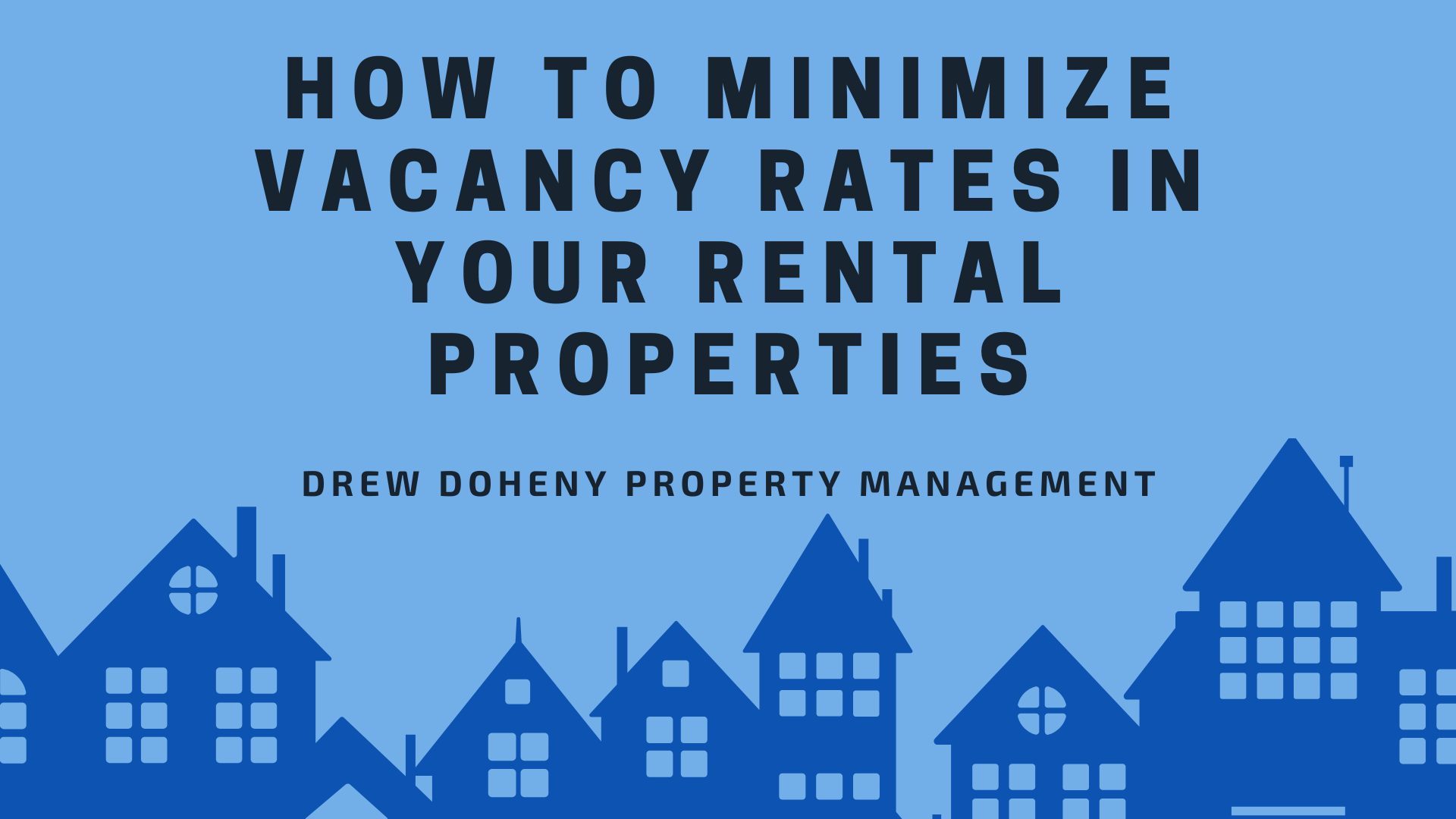
Key Takeaways
- Rent to quality tenants and maintain your property well to reduce vacancies and attract long-term renters.
- Be proactive with lease renewals and reasonable rent increases to keep good tenants and minimize turnover.
- Partner with the Drew Doheny Property Management Team for expert support in managing vacancies, maintenance, and tenant relations to maximize your ROI.
Vacancies, even short-term ones, can significantly impact your rental income. Every week your property sits empty, you’re not only missing out on potential rent but also covering expenses like repairs, maintenance, utilities, and mortgage payments from your own pocket.
At the Drew Doheny Property Management Team, we understand how critical it is for landlords to stay ahead of the curve. By being intentional and proactive in minimizing vacancy rates, you can protect your bottom line and ensure a steady stream of income.
In this blog, we’ll walk you through everything you need to know to keep your rental property occupied and performing at its best—with expert tips and strategies from our seasoned team.
Rent to Great Tenants
Becoming a successful landlord starts with renting to high-quality tenants—those who pay rent on time, care for the property, follow lease terms, and stay long-term.
To attract and secure these ideal renters, start by marketing your property strategically to a targeted audience to maximize visibility and draw in a strong applicant pool.
Then, implement a thorough screening process that includes detailed rental applications, income verification, employment checks, and references from previous landlords.
Finally, make sure your property is clean, well-maintained, and equipped with desirable amenities. Great tenants are more likely to choose and stay in homes that meet their needs and reflect pride of ownership.

Handle Maintenance Issues Promptly
Few things frustrate good tenants more than an unresponsive landlord. When maintenance or repairs are needed, responding quickly shows that you care about their comfort and well-being, an approach that often leads to higher tenant satisfaction, longer lease renewals, and ultimately, a stronger return on investment.
That said, staying on top of maintenance can be demanding and time-consuming, especially if you lack reliable vendor connections or find tenant calls inconvenient—like a 2 a.m. plumbing emergency. For greater peace of mind, consider partnering with a professional property management company.
They can handle everything from emergency calls to coordinating with trusted contractors, ensuring your property stays in top condition without disrupting your day-to-day life.
Offer Tenants Incentives for Renewing
Encouraging tenants to renew their lease before it expires is a key strategy for minimizing vacancies and maximizing your return on investment. One effective way to do this is by offering renewal incentives.
These can include perks like reserved parking, modest rent increases, rental upgrades, or even relaxing certain policies, such as allowing pets if previously restricted.
While offering incentives may come with a small cost, it’s often a smart investment when you have a reliable tenant. The expense of a short vacancy, just two weeks without rental income—can easily outweigh the cost of keeping a great tenant happy and in place.
Be Careful when Raising Rent
While raising rent is often necessary to stay competitive and maintain a healthy ROI, it’s important to approach it thoughtfully. Setting rates too high can drive away reliable tenants—something that rarely justifies the short-term financial gain.

Before implementing any increase, do your research: compare your rental to similar properties in the area and understand the standard rent hike in your market.
This due diligence helps ensure your rent remains fair and justifiable, balancing profitability with tenant retention. After all, keeping a great tenant is often more valuable than pushing for a higher monthly rate.
Reach Out About Lease Renewals Early
Don’t wait until the last minute to discuss lease renewals, starting the conversation early gives you time to plan and adapt. Ideally, reach out to tenants with long-term leases at least 90 days before the lease ends.
If they intend to stay, that’s great news. If not, you’ll still have time to offer renewal incentives or begin marketing the property to minimize vacancy.
Remember, the goal isn’t just to fill the unit, it’s to retain high-quality tenants who pay rent on time and take good care of the property. Proactive communication helps you keep the best tenants and avoid costly gaps in occupancy.
Market the Vacant Property Extensively
When your property becomes vacant, having a strong marketing strategy in place is essential to minimize downtime. Simply putting up a yard sign or spreading the word among friends isn’t enough—you need a comprehensive approach that ensures maximum visibility.
Use a mix of online and offline platforms, including yard signage, rental listing websites, social media, local newspapers, community bulletin boards, and printed flyers. However, before listing the property, make sure your rental ad stands out.
.jpg)
A strong listing should include high-quality photos of both the interior and exterior, a compelling headline to grab attention, and a detailed, engaging description that highlights the property’s key features and amenities. The better your marketing, the faster you’ll fill the vacancy with the right tenant.
Inspect the Rental Property Regularly
If your rental has been sitting vacant for longer than expected, it’s a good idea to inspect the property for potential issues that may be deterring prospective tenants.
Start with curb appeal, first impressions matter. Make sure the exterior is clean, well-maintained, and inviting. Inside, opt for neutral paint colors like beige, gray, or white to appeal to a broader range of renters.
Also, check that all electrical and plumbing systems are functioning properly—leaky faucets, flickering lights, or outdated fixtures can be major red flags. Regular inspections help you spot and address these issues early, increasing your chances of attracting quality tenants quickly.
Conclusion
Keeping vacancy rates low is crucial for maximizing your rental property's return on investment. While there are many strategies landlords can implement to reduce downtime, partnering with a professional property manager can be the most valuable step you take.
With years of experience and a deep understanding of the local market, the Drew Doheny Property Management Team offers tailored solutions to help you attract and retain quality tenants, handle maintenance efficiently, and keep your rental income steady.
If you're a landlord in Richmond Hill, GA, and want peace of mind with expert support, contact the Drew Doheny Property Management Team today to get started.
